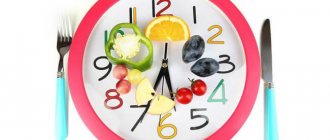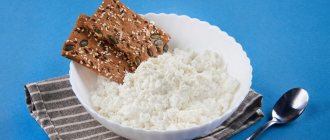What are simple (fast) carbohydrates? Table and list of products
By “fast” we mean simple carbohydrates that are easily processed by the body.
They only need a few minutes to decompose into simple molecules, enter the bloodstream, and supply the body with a charge of strength and energy. The speed of such processes is determined by the glycemic index: the higher it is, the less time the body spends on processing. You can find the value of the glycemic index in the corresponding tables, on the basis of which a daily diet for losing weight or maintaining your current weight can also be compiled. But before moving on to analyzing specific products, it is important to sort out questions about what the glycemic index is, what effect fast carbohydrates have, and whether it is worth adding them to the diet in principle.
Fast and slow carbohydrates - what's the difference?
Carbohydrates are complex chemical compounds that are important components of cells. According to structure and structure, they are divided into two large groups:
- Fast (or simple). The rate of breakdown and absorption of such carbohydrates is much higher than slow ones. They easily enter the blood, but the feeling of satiety is quickly replaced by a feeling of hunger due to a sharp jump in insulin. These include products containing glucose, fructose, lactose, sucrose or maltose. These are flour, confectionery products, sugar, carbonated drinks, alcohol.
- Slow (or difficult). They are characterized by a low rate of absorption: it can take the body up to four hours to digest food containing such carbohydrates. Throughout this time, a person feels full. For this they are also called “long” or “long”. This group includes products containing starch, fiber or pectin, glycogen. These are whole grain cereals, bread, pasta, vegetables, unsweetened fruits, herbs, and meat products.
When planning your diet, it is recommended to focus on slow carbohydrates. They provide a long-lasting feeling of satiety, good health, a boost of vigor and energy. But you shouldn’t give up fast carbohydrates completely, as this can lead to breakdowns. Nutritionists allow the addition of favorite, but “harmful” foods to the diet, provided that 85-90% is healthy food.
Complex carbohydrates for weight loss (porridge diets)
The diet is based on the daily consumption of cereal porridges, except semolina. The benefits of morning meals lie in the beneficial effects of fiber, which helps cleanse the intestines.
The fitness industry offers you to choose one of two options: a 10-day diet and a 7-day diet. The effect of each will be visible only by following certain rules.
"6 porridges"
Every day you eat porridge from any cereal. On the last day, repeat any dish you wish or prepare porridge from several cereals. The amount of consumption is not limited, since cereals are rich in slow carbohydrates.
The list of foods (the weight loss table indicates their GI) is varied, so choosing additional ingredients to sweeten porridges is not difficult.
They need to be boiled in unsalted water. A couple of days before the diet, exclude fast foods, spicy foods, alcohol and fried foods.
The diet is based on the daily consumption of cereal porridges, except semolina.
Diet "10 days"
Exclude potatoes, butter, all types of dairy products, bread, meat, fish, baked goods, and poultry from your diet. On diet days we eat porridge without salt. Before eating, be sure to drink a glass of water.
During every diet, it is permissible to sweeten food with honey, fruits and nuts. Frequency: once every 6 months. The solution is achieved by gradually adding prohibited goods.
Glycemic index
The glycemic index (GI) refers to the rate at which the human body absorbs carbohydrates from food. This definition came from medicine at the end of the century. It was introduced by Canadian University nutritionist David J. A. Jenkins. He was trying to understand what diet is most suitable for people with diabetes. To this end, he developed his own classification of products, focusing on how blood glucose levels change after consuming them. The results of the work done were presented in the article “Glycemic index of food products: the physiological basis of carbohydrate metabolism.”
In his work, Dr. David Jenkins explained how the amount of carbohydrates in food and a person’s well-being are connected. A normal level of blood glucose helps to increase energy: a person feels cheerful, performance and concentration increase. A sharp jump in sugar, as well as a decrease in sugar, can cause a loss of strength.
It turns out that the human body needs to constantly maintain the level of insulin in the blood - this is the key to good health, strength, and energy. In addition, it is necessary to avoid sudden spikes in sugar. In this regard, a 100-point glycemic index scale was developed, according to which all products are divided into three categories:
- with a low glycemic index – below 55 units;
- with average – from 55 to 70;
- with high – over 70.
When compiling a diet, it is advisable to give preference to foods with a low glycemic index. They provide a long-lasting feeling of satiety and good health.
How to understand without tables that a product belongs to the category with a low glycemic index? There are three rules:
- Cellulose. The more dietary, plant fiber, the lower the GI.
- Proteins and fats: the more there are, the lower the GI value.
- No heat treatment: high temperatures destroy plant fibers, so fruits and vegetables are best eaten fresh.
But don’t be afraid of fast carbohydrates with a high GI and completely exclude them from your diet. They can also bring certain benefits, the main thing is moderation and strict portion control.
How to lose weight with carbohydrates, proteins, fats
Knowledge is power, and separate nutrition is power, assure crowds of men and women who have achieved ideal indicators on the scales thanks to the separate nutrition system. The main advantage of separate nutrition is the absence of strict prohibitions, and therefore, breakdowns. The creator of the system is Dr. Herbert Shelton, famous in the twentieth century.
So, the rules of separate nutrition (or carbohydrate-protein diet):
- Never eat proteins with carbohydrates. The latter should be put into the mouth no earlier than three to four hours after eating protein food.
- A carbohydrate food is one that contains at least 20% carbohydrates. A protein product is one that contains more than 10% protein.
- One meal should contain only 3-4 foods, either protein or carbohydrate. Are you planning to have a healthy vegetable salad for lunch? And it should be prepared with no more than 2-3 ingredients!
- Planning a protein lunch or dinner? Supplement it with a freshly chopped vegetable salad without starch (for example, Chinese cabbage, fresh cucumber, juicy radish, red-sided tomato).
- Avoid combining carbohydrate foods with a GI above 60 with foods containing acids (lemon, apple, grapefruit, tomato).
- Acidic foods are also incompatible with raisins (cottage cheese, fish, etc.).
- If giving up sugar is very difficult, replace it with bee products. Don’t be cunning and buy food with “unnoticeable” sugars.
- No mono diet! No monotonous diet, otherwise there is a high risk of serious harm to your health. On one day, alternate meals as much as possible in different meals.
- Do you want some bread? Eat! But not as a snack to chicken broth or vegetable salad, but as a separate independent product - an autonomous meal.
- For pregnant women, any food experiments and diets are completely prohibited. Restrictions on food and adjustments to the diet of an expectant or nursing mother should occur under the strict supervision of a supervising physician.
The importance of fast carbohydrates in nutrition
Carbohydrates are the main source of energy for humans. But foods with a high glycemic index give only a temporary effect, which is replaced by a loss of strength and a deterioration in concentration. However, the body may need fast carbohydrates in some cases to quickly restore energy. For example, food with a GI value over 70:
- helps to cope with various mental work, activate brain function;
- helps replenish glycogen reserves;
- participates in cellular metabolism;
- improves mood, fights depression;
- controls the synthesis of hormones, promotes the production of dopamine and serotonin, which affect mood;
- block toxins and harmful substances coming from the environment.
In addition, fast carbohydrates with a high glycemic index are necessary for people who regularly visit the gym and prefer high-intensity workouts. They supply the body with “fast” energy and increase endurance.
The benefits and harms of carbohydrates
The main benefits still come from complex, slow carbohydrates. Products containing them, as a rule, are also rich in vitamins, minerals, antioxidants and amino acids. All this is necessary for the human body to carry out various metabolic processes and functions:
- Replenishment of energy reserves. You should know that carbohydrates perform this function only when working together with proteins and fats. That is why it is important to follow the “plate rule” and ensure that the products are combined with each other. To do this, you need to adhere to the principles of proper, healthy nutrition. No diet can provide the body with nutritional components to the proper extent.
- Improving the functioning of the central nervous system. The functioning of brain cells largely depends on the amount of glucose. If there is enough of it, a person feels good, but with a sharp decrease in it, a decline is observed, absent-mindedness and ailments in the form of dizziness and drowsiness appear.
- Increased muscle tissue. Muscle growth occurs due to protein with the participation of carbohydrates. If the level of glucose in the blood is insufficient, cell destruction occurs and metabolic processes slow down.
- Regulation of the gastrointestinal tract. Slow carbohydrates, for the most part, are rich in fiber and plant fibers, which are not digested and do not decompose under the action of enzymes. They help cleanse the intestines and create favorable conditions for the proliferation of beneficial bacteria.
Carbohydrates play a very important role in the functioning of the body. Therefore, under no circumstances should they be excluded from the diet, as required by various diets.
What are the benefits of simple carbohydrates?
According to studies, it has been proven that the presence of sugars allows the body to better absorb foods enriched with fats and proteins. Nutritionists and doctors have come to the same conclusion - the diet should include most of the slow substances, but when it is necessary to restore energy levels in an extremely short time, even for a short period of time, fast carbohydrates are simply irreplaceable. Due to the immediate increase in blood glucose, a surge in insulin is observed, and blood circulation becomes more intense. Muscle tone also increases significantly.
The table of products containing easily digestible elements offered on our website will help you create a nutritious diet, taking into account the characteristics of your activity, the functioning of the body and the goals being achieved. These food components are distinguished by their ability to:
- eliminate dizziness and faintness;
- help get rid of attacks of nausea;
- activate the functioning of the brain when solving complex issues and problems;
- replenish glycogen reserves;
- neutralize toxins;
- assist cells in building a framework;
- provide assistance in the fight against stress and depression.
With regular visits to the gym and intense exercise, easily digestible carbohydrates are also very useful, but in small quantities.
Use our table to calculate the simple and complex carbohydrates you consume, which will help you recover after workouts, achieve your goals in shaping your figure, and improve your well-being in certain cases.
How many carbohydrates do we need?
The amount of carbohydrates in the diet depends on gender, age, activity level and other individual characteristics of a person. So, for example, a man leading a normal lifestyle, without training, needs about 200-250 grams per day, and a woman - only 150-200. A lack of them can cause weakness, apathy, fatigue, and an excess can lead to gaining extra pounds. The approximate daily dosage is given in the table.
| Weight 50-55 kg | Weight 60-65 kg | Weight 70-75 kg | Weight 80-85 kg | |
| Men | ||||
| Weight loss | 165 | 170 | 175 | 185 |
| Weight maintenance | 220 | 235 | 245 | 265 |
| Mass gain | 280 | 295 | 310 | 320 |
| Women | ||||
| Weight loss | 110 | 140 | 160 | 170 |
| Weight maintenance | 140 | 160 | 190 | 210 |
| Mass gain | 190 | 240 | 250 | 260 |
You can determine without scales or other devices how much carbohydrates you need to eat using the “plate rule”:
- half of the dish should consist of greens and non-starchy vegetables;
- a quarter for protein;
- the rest goes to starchy vegetables.
This portion will ensure a feeling of satiety for a long time, provide the body with the necessary energy, and will not cause a spike in insulin in the blood. This principle applies to all main meals: breakfast, lunch, dinner.
Authorized Products
The basis of carbohydrate foods is buckwheat, oatmeal, wheat and rice porridge cooked in water. Be sure to include in your diet all legumes (beans, lentils, peas, chickpeas), whole grain baked goods (whole wheat pasta, whole grain bread). A good source of complex carbohydrates is boiled or baked potatoes.
Do not limit proteins in your diet - eat chicken, rabbit, veal, and low-fat cheese. It is imperative to eat fresh vegetables and fruits rich in fiber: cabbage, zucchini, carrots, eggplants, cucumbers, tomatoes, melons. As for fats, it is recommended to consume refined vegetable oils and, in smaller quantities, butter.
Table of permitted products
| Proteins, g | Fats, g | Carbohydrates, g | Calories, kcal | |
| eggplant | 1,2 | 0,1 | 4,5 | 24 |
| boiled peas | 6,0 | 0,0 | 9,0 | 60 |
| zucchini | 0,6 | 0,3 | 4,6 | 24 |
| cabbage | 1,8 | 0,1 | 4,7 | 27 |
| broccoli | 3,0 | 0,4 | 5,2 | 28 |
| carrot | 1,3 | 0,1 | 6,9 | 32 |
| cucumbers | 0,8 | 0,1 | 2,8 | 15 |
| tomatoes | 0,6 | 0,2 | 4,2 | 20 |
| beans | 7,8 | 0,5 | 21,5 | 123 |
| lentils | 24,0 | 1,5 | 42,7 | 284 |
| buckwheat | 4,5 | 2,3 | 25,0 | 132 |
| oatmeal | 3,2 | 4,1 | 14,2 | 102 |
| millet porridge | 4,7 | 1,1 | 26,1 | 135 |
| white boiled rice | 2,2 | 0,5 | 24,9 | 116 |
| whole grain bread | 10,1 | 2,3 | 57,1 | 295 |
| cottage cheese | 17,2 | 5,0 | 1,8 | 121 |
| veal | 19,7 | 1,2 | 0,0 | 90 |
| rabbit | 21,0 | 8,0 | 0,0 | 156 |
| boiled chicken breast | 29,8 | 1,8 | 0,5 | 137 |
| turkey | 19,2 | 0,7 | 0,0 | 84 |
| * data is per 100 g of product | ||||
What foods are classified as fast carbohydrates: list of foods
Quickly digestible carbohydrates can be included in the diet in small portions. Let's look at the full list of products where they are contained:
- baked goods, bakery and confectionery products: white bread, cakes, cookies, toast and croutons, crackers, crackers;
- cereals: white rice, instant oatmeal, millet, corn grits, semolina;
- chocolate, marmalade, marshmallows, candies, lollipops, waffles, ice cream;
- glazed curd cheeses;
- soft wheat pasta;
- wheat, rice, corn flour;
- cereals for quick breakfasts;
- sweet muesli with nuts and raisins;
- vegetables: boiled carrots, turnips, celery, parsnips, boiled corn, zucchini, squash, pumpkin;
- squash caviar;
- sugar, starch, honey;
- condensed milk;
- rice or wheat noodles;
- potatoes: fried, baked, fries;
- canned fruits: apricots, peaches, pineapples;
- dried fruits: dates, raisins, dried apricots, dried peaches, apricots and pears;
- alcohol, including beer;
- corn syrup;
- sweet fruits: banana, ripe watermelon, grapes;
- carbonated drinks with sugar;
- compote;
- sweet juices.
But it is recommended to focus not only on this list, but also on the glycemic index.
Table of fast carbohydrates in foods with a high glycemic index (above 70 units)
| Product | Glycemic index indicator | Amount of carbohydrates per 100 grams of product |
| Alcohol (average) | 116 | 0-50 |
| Watermelon | 102 | 8 |
| Canned apricot | 90 | 67 |
| Loaf or white bread | 135 | 52 |
| Hamburger buns | 87 | 50 |
| Swede | 88 | 8 |
| Legumes | 79 | 9 |
| Baked goods, confectionery, cakes (on average) | 102 | 70 |
| Corn syrup | 114 | 77 |
| Cola, other carbonated sweet drinks | 100 | 12 |
| Potatoes: fried, boiled, fries | 94 | 27 |
| Starch | 94 | 84 |
| Cracker | 81 | 68 |
| Boiled corn | 76 | 23 |
| Zucchini | 74 | 5 |
| Squash caviar | 74 | 9 |
| Semolina | 74 | 74 |
| Compote | 71 | 15 |
| Brown sugar | 70 | 97 |
| Canned fruits | 70 | 68-75 |
| Rice noodles | 90 | 84 |
| Lollipops | 79 | 98 |
| Honey | 89 | 81 |
| Pasta | 89 | 74 |
| Wheat flour | 87 | 72 |
| Rice flour | 78 | 81 |
| Corn flour | 70 | 74 |
| Boiled carrots | 84 | 5 |
| Sweet muesli | 79 | 65 |
| Condensed milk | 79 | 56 |
| Ice cream | 70 | 23 |
| Beer | 115 | 0-53 |
| Parsnip | 97 | 9 |
| Canned peaches | 92 | 67 |
| Squash | 75 | 5 |
| Cake | 75 | 76 |
| Millet | 71 | 76 |
| White rice | 90 | 77 |
| Turnip | 84 | 6 |
| Glazed curd cheese | 70 | 10 |
| Juice | 74 | 8 |
| Crackers | 74 | 72 |
| Celery | 86 | 3 |
| Sugar | 100 | 100 |
| Toasts | 100 | 45 |
| Pumpkin | 75 | 5 |
| Dates | 145 | 73 |
| Milk chocolate | 70 | 67-83 |
| Chocolate candies | 70 | 73 |
Table of fast carbohydrates in foods with an average glycemic index (55 - 70 units)
| Product | Glycemic index indicator | Amount of carbohydrates per 100 grams of product |
| A pineapple | 67 | 13 |
| Banana | 60 | 23 |
| Grape | 41 | 17 |
| Polka dots | 65 | 7 |
| Melon | 65 | 8 |
| Raisin | 64 | 72 |
| Figs | 64 | 14 |
| Yogurt with added sugar and fruit | 58 | 9 |
| Corn | 66 | 23 |
| Dried apricots | 65 | 66 |
| Potato | 63 | 16 |
| Coffee with sugar or tea | 60 | 7 |
| Compote with a little sugar | 59 | 15 |
| Raw carrots | 64 | 8 |
| Mango | 51 | 15 |
| Mayonnaise | 61 | 3 |
| Papaya | 59 | 13 |
| Sprouted wheat | 63 | 42 |
| Unpolished rice | 65 | 73 |
| Sour cream | 56 | 4 |
| Cheese | 59 | 14 |
| Beet | 64 | 9 |
| Whole grain bread | 66 | 50 |
| Hercules flakes | 67 | 68 |
List of foods with slow carbohydrates
There are many foods that contain complex carbohydrates. As a rule, this is starch. The main feature of such ingredients is their neutral taste and lack of pronounced sweetness. In other words, the exact opposite of foods with lots of simple carbohydrates.
The list of foods consisting of slow carbohydrates is quite wide. The main ingredients are:
- pasta made from durum wheat;
- porridge;
- legumes;
- bread baked from wholemeal flour;
- beans;
- cookies without added sugar;
- Brown sugar;
- soy;
- dried apricots;
- grapefruit, orange, cherry and other fruits and berries;
- hulled barley;
- onion;
- spinach;
- peppers, cauliflower and many other types of vegetables;
- mushrooms and other ingredients.
Products from the above list should be present in the daily diet of any person. They not only help you lose weight, but also help improve the functions of the digestive system and overall health.
Fast carbohydrates and sports
As already mentioned, there are hard-to-digest and easily-digested carbohydrates, which get their names based on the speed of processing by the body. The field of sports nutrition has its own rules regarding how and when to consume these types of products during physical activity of varying intensity.
Slow carbohydrates are recommended to be consumed two to three hours before training. They will provide a stable, uniform flow of energy that will last until the end of the session in the gym.
It is recommended to consume fast carbohydrates within half an hour after training, while the so-called “carbohydrate window” lasts. What is it for? The thing is that after intense exercise, the body needs strength to restore and replenish the amount of glycogen in muscle tissue, which is destroyed during the training process.
The serving size should be small, about 100 grams. It is not necessary to eat conventionally “bad”, “harmful” foods, such as fast food or confectionery. A few dried fruits, a small banana or other sweet fruit, a serving of white rice or pasta - that's what will really do you good.
Daily carbohydrate intake and its limitations
Reducing the carbohydrate intake will lead to metabolic disorders. Deficiency will reduce immunity, brain activity and physical activity.
Weakness and fatigue will soon appear. Therefore, find the right approach to consuming slow carbohydrates.
Print out a weight loss chart and review the grocery list periodically to remember which foods are healthy and which will harm your body.
It is not easy to answer the question regarding the rate of carbohydrate intake, due to the existence of several theories. Some nutritionists believe that per kilogram of our body weight we need to consume 4 grams. carbohydrates per day. But this diet is prescribed taking into account daily physical activity.
Others claim that for weight loss it is enough to consume 1-2 grams of carbohydrates. for every kilogram of weight. In this case, the diet involves eating your favorite dish once a week, including one with a lot of sugar.
Find the right approach to consuming slow carbohydrates.
Still others are inclined to believe that losing weight on a low-calorie diet is possible without doing physical activity. In this case, the daily carbohydrate intake should not exceed 2 grams. for every kilogram of body weight.
Expert opinion
You should not perceive fast carbohydrates as something terrible that entails extra pounds and health problems. Excess weight can appear due to various reasons, and, for the most part, they are psychological, which cannot be solved by changing the diet because it is their consequence, and not vice versa. First, a person gets stressed, then he reacts painfully to it, and then, as a consolation, he eats a lot. No one is ever immune from troubles; it is impossible to get rid of them. Therefore, it is the middle link of this “chain of overeating” that is subject to correction: the reaction to them that leads a person to the kitchen, to the refrigerator, to the big-mac or shawarma shop. This is the field of activity of a psychotherapist and weight loss specialist. It is he, with his arguments and questions, who is the first to stand in the way of you adding extra pounds. Well, and then, in general, of course, the comprehensive work of a psychologist, nutritionist, fitness instructor, and sometimes a cosmetologist is important for health, joy and beauty.











